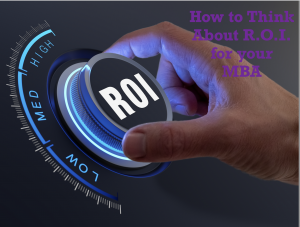|
Is Grad School Worth It? Calculating Your Return on Investment |
||
Is Grad School Worth It? Calculating Your Return on Investment
In a recent discussion I had with Andrea Flores from IE University in Madrid, we talked about the Return on Investment of an MBA. It was a fantastic discussion that allowed us to explore ROI as a broad concept, but I did receive some messages from listeners asking me for a “sample formula” for calculating ROI. So, I decided to oblige. Importantly, this calculation doesn’t JUST apply to prospective MBA students. It’s also germane to other graduate and professional degrees.
That said, before I lay this out, I want to stress that there are a range of intangibles that every applicant must take into account, and thus this formula should be just one factor of many. For instance, what value do you place on moving into a career that you find more fulfilling or meaningful, even if the boost in salary isn’t necessarily a positive ROI? On the other hand, using this approach will at least allow you to see what choosing a particular field (or, to put a point on it, choosing happiness) will cost you monetarily.
So, for those applicants who don’t know, ROI is a statistic used in finance to gauge how profitable an investment is. Calculating the ROI in the context of graduate school can assist prospective students in determining if getting an Master’s or PhD is a wise financial move.
Here are the variables you must take the following into account when calculating the return on investment for grad school:
- Tuition costs: Depending on the university and program, an graduate degree might be expensive. The majority of graduate programs cost $30,000 to $100,000.
- Opportunity cost: Entering grad school entails a large time commitment, usually two years of full-time study, but sometimes up to six. This implies that during this period, pupils will have to pass up possibilities like working or continuing their studies. The potential money that a student may have made while in the program is the opportunity cost of graduate school.
- Financial assistance: A lot of schools provide financial assistance in the form of loans, grants, and scholarships. When estimating the return on investment of grad school, it's crucial to take them into account since they may help offset the cost of tuition and living expenses.
- Salary boost: Increasing one's earning potential is one of the main motivations for grad school. Many graduates get a large raise in pay after finishing the program. To estimate the possible financial advantages of grad school, this rise should be considered when calculating ROI.
After taking these things into account, do the following:
- Calculate the program's overall cost. This should include living costs, tuition fees, and any additional expenditures related to completing the degree. Most programs will have sample budgets and also give a simple “full cost of attendance” for students. Public institutions will break it down by in-state, out-of-state, and international students, as well as by type of program (part-time, full-time, etc.)
- Calculate the opportunity cost. This represents the potential earnings the student may have made while enrolled in the program had they not been pursuing a grad school.
- To calculate the net cost of the program, deduct any financial help obtained from the total cost.
- Calculate the income boost the student may anticipate receiving once they have finished the program.
- To calculate the ROI, divide the anticipated income gain by the net cost of the program. The ROI, for instance, would be 33.33% if the net cost of grad school was $60,000 and the anticipated wage gain was $20,000 per year.
It's crucial to keep in mind that the ROI for grad school might change based on the student and the exact school they select. After earning a graduate degree, some students could have a greater wage boost while others would not. The price of a program might also change based on the school and the particular program. Therefore, while calculating ROI, it's crucial for prospective students to carefully analyze these elements and perform their own computations.
Again, I think that this is very useful data in terms of figuring out whether it makes financial sense, BUT as our podcast conversation makes clear, you’re not a “homo economicus” that makes decisions purely on salary and financial outcome. Use this data point as one of many to determine whether grad school is for you!
For more help with your personal statement, check us out at Gurufi.com. Our personal statement editors and consultants have decades of experience helping clients get into top Masters and Ph.D. programs in STEM, humanities, fine arts, and social sciences. Our specialty is helping you craft compelling personal statements that move the needle in your admissions process! For questions, shoot us an email at service@gurufi.com. Check us out on Facebook, Twitter, and LinkedIn.

[0] Comments to this Article